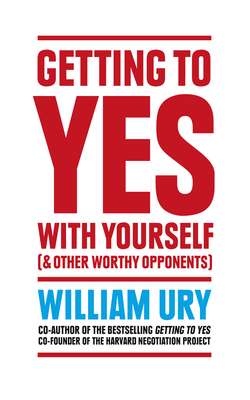Getting to Yes with Yourself: And Other Worthy Opponents

Реклама. ООО «ЛитРес», ИНН: 7719571260.
Оглавление
William Ury. Getting to Yes with Yourself: And Other Worthy Opponents
Copyright
Introduction. The First Negotiation
Our Worthiest Opponent
Six Challenging Steps
How to Use This Book
Put Yourself in Your Shoes
See Yourself from the Balcony
Listen With Empathy
Uncover Your Needs
From Self-Judgment to Self-Understanding
Develop Your Inner BATNA
Own Your Life
Own Your Relationships
Own Your Needs
From Blame to Self-Responsibility
Reframe Your Picture
Remember Your Connection to Life
Make Your Own Happiness
Appreciate Life’s Lessons
From Unfriendly to Friendly
Stay in the Zone
Learn to Let Go
Accept the Past
Trust the Future
Embrace the Present
From Resistance to Acceptance
Respect Them Even If
Put Yourself in Their Shoes
Expand Your Circle of Respect
Respect Them Even if They Reject You
From Exclusion to Inclusion
Give and Receive
Give for Mutual Gain
Give for Pleasure and Meaning
Give What You are here to Give
From Win-Lose to Win-Win-Win
Conclusion. The Three Wins
A Win Within
A Win With Others
A Win for the Whole
Winning the Game of Life
Notes
Acknowledgments
About the Author
Also by William Ury
About the Publisher
Отрывок из книги
To my teachers—with profound gratitude
Title Page
.....
Listening to yourself with empathy goes one level deeper than observing. To observe is to see from the outside, whereas to listen is to feel from the inside. Observing offers you a detached view, whereas listening gives you an intimate understanding. Observation gives us the understanding of a scientist studying what a beetle looks like under a microscope, whereas listening gives you the understanding of what it feels like to be a beetle. You can benefit from both modalities together. Anthropologists have found that the best way to understand a foreign culture is to participate in it actively and at the same time to maintain an outside observer’s perspective. I find this method, called participant observation, is equally useful when it comes to understanding ourselves.
As I listen to myself, I notice that the majority of my problematic emotions are the same every day. For example, one anxiety that pops up regularly concerns the daily to-do list that only seems to expand: Will I be able to get through it? To understand and reduce the intensity of these recurring feelings, I have come up with a daily exercise: In the morning, I imagine sitting at a kitchen table. As each familiar thought or emotion such as anxiety or fear, shame or pride shows up, I offer it an imaginary seat. I have learned to welcome all customers, no one excluded. I seek to treat them as the old friends or acquaintances that they are. As the kitchen table fills up, I listen to the free-flowing conversation of feelings and thoughts.
.....